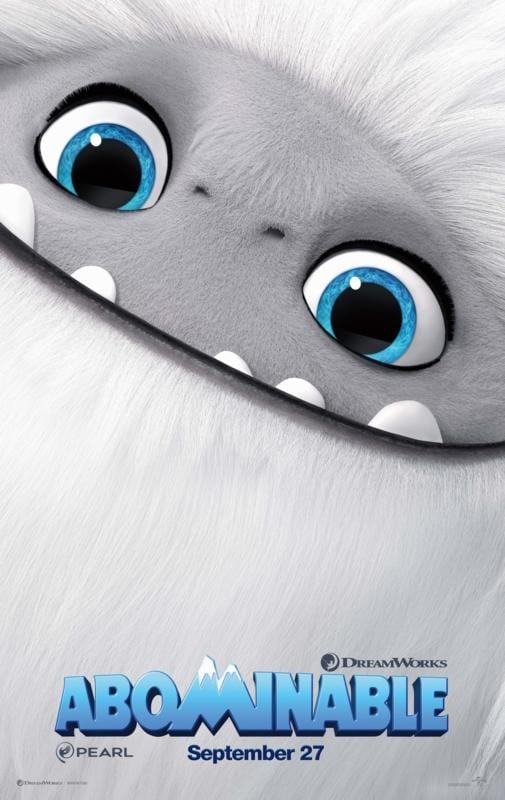Abominable, 2019.
Directed by Jill Culton.
Featuring the voice talents of Chloe Bennet, Tenzing Norgay Trainor, Albert Tsai, Eddie Izzard, Sarah Paulson, Tsai Chin, Michelle Wong, Joseph Izzo, and Rupert Gregson-Williams.
SYNOPSIS:
A magical Yeti must return to his family.
Abominable has the ingredients to break free from being designated as just another disposable family-friendly animated feature, but they are buried so far down below that all that’s left (until around the final 30 minutes where the movie somewhat decides to embrace it’s imaginative and unique aspects) are the genre’s standard annoyances and clichés. Written and directed by Jill Culton (who has plenty of experience in the animation department storyboarding features and developing characters), the concept of the story seems designed to center on the dynamic between Yi (Chloe Bennet) and young yeti Everest. She copes with the depression brought on by her father’s death by escorting the magical yeti (she finds him hiding out on the roof of her Shanghai apartment), that can manipulate nature in numerous ways to solve traveling woes, back to his Himalayan namesake home.
Yi likes to keep busy making money, whether it’s walking dogs or babysitting children or taking out the trash for various establishments, but she’s not sure why she’s doing any of it. Explaining away the money part is simple; before her father died they were planning on traveling all over China together visiting famous landmarks, so taking on these odd jobs is a realistic way of ensuring those dreams come true from a financial standpoint. Dad also loved playing the violin for Yi, which made her feel at ease, and now takes up playing that same instrument herself (credit Rupert Gregson-Williams as those instrumental musical beats make for some of the film’s most moving moments, especially with the aforementioned composer doing Everest’s synchronized voiceover humming).
Both characters are lost in a sense; Everest just wants to get back home to his yeti family and away from captivity under nefarious motives, while Yi’s journey is an emotional one of reigniting her passion for family and attaining closure over the loss of her father. More ambitious filmmakers would have had the boldness to only stick these two characters front and center (regardless of if one of them can’t talk) and hone in on that dynamic and its inherent themes. By extension, there would be something much more impactful and dramatic yet still lighthearted and capable of entertaining children. Again, some of this is accomplished during the third act which puts a twist on Everest’s abilities and focuses more on the serious elements. It feels rushed, but at least Abominable is finding its purpose in the home stretch.
Instead, a pair of seemingly corporate-mandated companions (another animation department specialist, Todd Wilderman, is a co-director which might explain the disjointed presentation) are along for the quest, paving the way for the lame slapstick humor to be expected from a family adventure. It’s a give-and-take scenario; there is a beautiful segment where Everest grows blueberries bigger and bigger and eventually to massive size (he’s a baby yeti and behaves like so, unaware of what his powers are doing), only for those same blueberries to start launching all over the environment like flinging cannonballs, with two of them winding right inside the pants/butt of one of the comedic relief friends. One of them is obsessed with playing basketball, the other is self-centered and can’t put his phone down for anything; nothing about them is interesting and all they do is hinder what should be a compelling story. The villains are just as forgettable but at least the script makes an attempt to play with their tropes.
Every time Yi and Everest are granted the opportunity to be alone, Jill Culton’s goals sink in. However, the majority of the isolated moments are serene and focus on character building; there is something exquisitely beautiful watching Yi play the violin as Everest does wonders to nature surrounding him. In addition to outstanding animation, the narrative takes us around the world with a variety of terrains and one stunning sequence where Everest uses his powers to create rollercoaster sized inclines out of a flower field, rapidly going downhill with the group on a boat as a means to escape the generic bad guys.
The supporting characters always return to muck everything up. A better version of Abominable wouldn’t need those characters to comment about Yi being distant and how she needs to reconnect with all of the love around her. Not only does it miss the mark emotionally, but the attempts at humor also induce cringe and outweigh the positives. Sure, children will have fun, but there is a much better movie inside Abominable. Much like mythological yetis themselves and general fear of the unknown, that, unfortunately, happens to be something mainstream audiences probably aren’t ready for.
Flickering Myth Rating – Film: ★ ★ / Movie: ★ ★ ★
Robert Kojder is a member of the Chicago Film Critics Association and the Flickering Myth Reviews Editor. Check here for new reviews, friend me on Facebook, follow my Twitter or Letterboxd, check out my personal non-Flickering Myth affiliated Patreon, or email me at MetalGearSolid719@gmail.com














